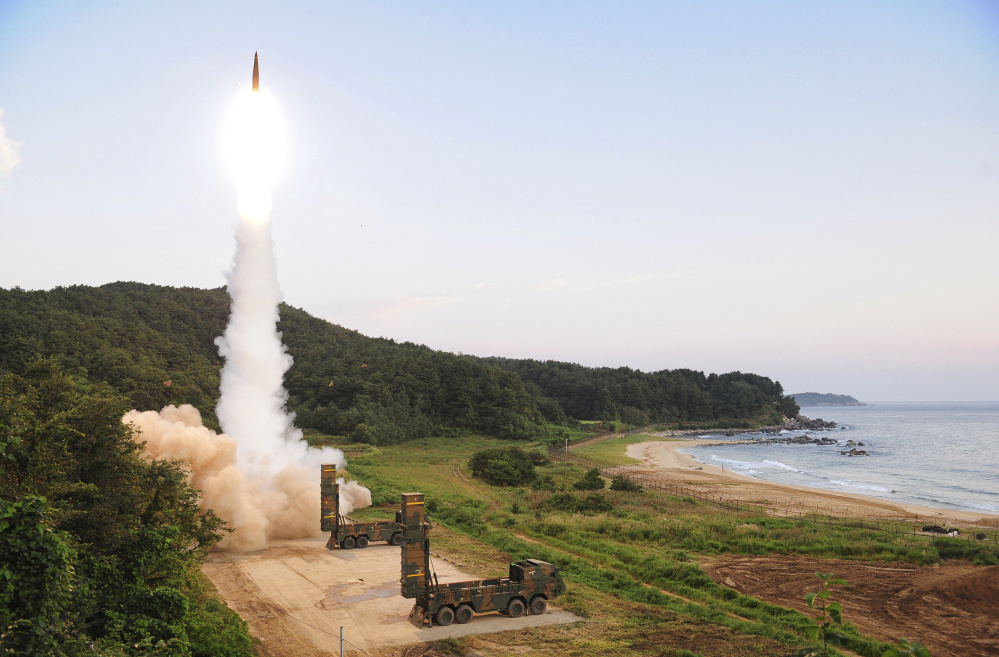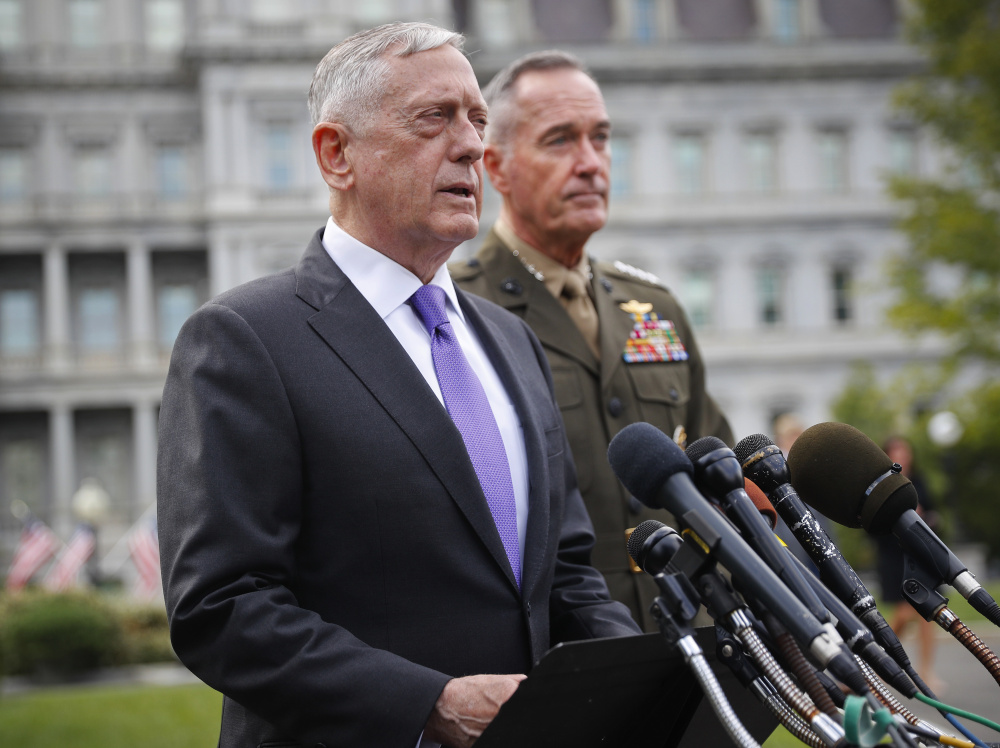WASHINGTON — Defense Secretary Jim Mattis on Sunday shot back at North Korea’s claimed test of a hydrogen bomb with a blunt threat, saying the U.S. will answer any threat from the North with a “massive military response – a response both effective and overwhelming.”
Earlier, President Trump threatened to halt all trade with countries doing business with the North, a veiled warning to China, and faulted South Korea for its “talk of appeasement.”
The tough talk from America’s commander in chief and the retired Marine general he picked to oversee the Pentagon came as the Trump administration searched for a response to the escalating crisis. Kim Jong Un’s regime Sunday claimed “perfect success” in an underground test of what it called a hydrogen bomb. It was the North’s sixth nuclear test since 2006 – the first since Trump took office in January – and involved a device potentially vastly more powerful than a nuclear bomb.
Trump, asked by a reporter during a trip to church services if he would attack the North, said: “We’ll see.” No U.S. military action appeared imminent, and the immediate focus appeared to be on ratcheting up economic penalties, which have had little effect so far.
In South Korea, the nation’s military said it conducted a live-fire exercise simulating an attack on North Korea’s nuclear test site to “strongly warn” Pyongyang over the latest nuclear test. Seoul’s Joint Chiefs of Staff said the drill involved F-15 fighter jets and the country’s land-based “Hyunmoo” ballistic missiles.The released live weapons “accurately struck” a target in the sea off the country’s eastern coast, the JCS said.
The U.N. Security Council scheduled an emergency meeting at the request of the U.S., Japan, France, Britain and South Korea. It would be the Security Council’s second urgent session in under a week on the North’s weapons tests, which have continued in the face of a series of sanctions.
Members of Congress expressed alarm at the North’s test and emphasized strengthening U.S. missile defenses. Leaders in Russia, China and Europe issued condemnations.
In briefs remarks after a White House meeting with Trump and other national security officials, Mattis told reporters that America does not seek the “total annihilation” of the North, but then added somberly: “We have many options to do so.” The administration has emphasized its pursuit of diplomatic solutions, knowing the potentially horrific costs of war with the North. But the decision to have Mattis deliver a public statement seemed to suggest an escalating crisis.
Mattis also said the international community is unified in demanding the denuclearization of the Korean peninsula and that Kim should know that Washington’s commitment to Japan and South Korea is unshakeable.
The precise strength of the underground nuclear explosion had yet to be determined. South Korea’s weather agency said the artificial earthquake caused by the explosion was five times to six times stronger than tremors generated by the North’s previous five tests.
North Korea’s state-run television broadcast a special bulletin to announce the test, and said Kim attended a meeting of the ruling party’s presidium and signed the go-ahead order. Earlier, the party’s newspaper published photos of Kim examining what it said was a nuclear warhead being fitted onto an intercontinental ballistic missile.
Sunday’s detonation builds on recent North Korean advances that include test launches in July of two ICBMs that are believed to be capable of reaching the mainland U.S. The North says its missile development is part of a defensive effort to build a viable nuclear deterrent that can target U.S. cities.
The Arms Control Association said the explosion appeared to produce a yield in excess of 100 kilotons of TNT equivalent, which it said strongly suggests the North tested a high-yield but compact nuclear weapon that could be launched on a missile of intermediate or intercontinental range.
Hans Kristensen, a nuclear weapons expert at the Federation of American Scientists, said the North probably will need to do more tests before achieving a functioning hydrogen bomb design.
Beyond the science of the blast, North Korea’s accelerating push to field a nuclear weapon that can target all of the United States is creating political complications for the U.S. as it seeks to balance resolve with reassurance to allies that Washington will uphold its decades-long commitment to deter any nuclear attack on South Korea and Japan.
That is why some questioned Trump’s jab Sunday at South Korea. He tweeted that Seoul is finding that its “talk of appeasement” will not work. The North Koreans, he added, “only understand one thing,” implying military force might be required. The U.S. has about 28,000 troops stationed in South Korea and is obliged by treaty to defend it in the event of war.
Patrick Cronin, an Asia expert with the Center for a New American Security, said Trump’s comment on South Korea was probably “intended to stiffen the spine of an ally.” He said he agreed with the intention.
“I think Washington is very serious about showing some unexpected resolve,” he said. “We need our ally and we need to remain ironclad. But at the same time, we can’t afford South Korea to go weak in facing down this growing danger.”
Trump also suggested putting more pressure on China, the North’s patron for many decades and a vital U.S. trading partner, in hopes of persuading Beijing to exert more effective leverage on its neighbor. Trump tweeted that the U.S. is considering “stopping all trade with any country doing business with North Korea.” Such a halt would be radical. The U.S. imports about $40 billion in goods a month from China, North Korea’s main commercial partner.
It’s unclear what kind of sanctions might make a difference. Lassina Zerbo, head of the U.N. test ban treaty organization, said sanctions already imposed against North Korea aren’t working.
Experts have questioned whether the North has gone too far down the nuclear road to continue pushing for a denuclearization of the Korean Peninsula, an Obama administration policy goal still embraced by Trump’s White House.
Send questions/comments to the editors.





